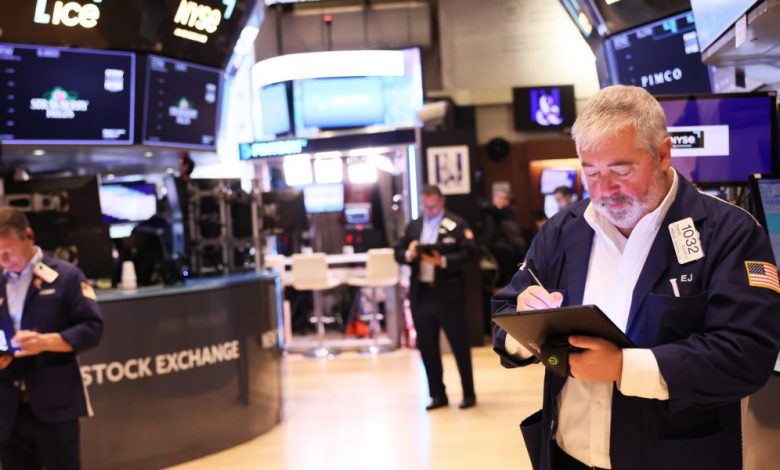Interest rate concerns send stocks into the worst week of the year

Another cold reminder that inflation is staying hotter than hoped caused Wall Street to slide on Friday, and stocks ended their worst week since early December.
The S&P 500 fell 1.1% to cap its third straight weekly loss. The Dow Jones Industrial Average fell as much as 510 points before shedding 336 points, or 1%, while the Nasdaq Composite lost 1.7%.
Stocks fell in February as a slew of reports showed that everything from inflation to jobs to buyer spending remained hotter than expected. That has forced Wall Street to raise its forecasts of how high the Federal Reserve will have to raise interest rates and how long they will stay there.
Higher interest rates can lower inflation, but they also increase the risk of a recession by slowing down the economy. They also hurt the prices of stocks and other assets.
The latest reminder came on Friday after a report showed that the Fed’s preferred inflation measure came in higher than expected. Prices in January were 4.7% higher than a year earlier after ignoring food and energy costs as they can fluctuate faster than others. That was an acceleration from the December inflation rate, which showed the wrong momentum, and it was higher than economists’ expectations for 4.3%.
It echoed other reports from earlier in the month that showed January inflation was higher than expected at both the consumer and wholesale levels.
Other data on Friday showed that consumer spending returned to growth in January, up 1.8% from December. This is crucial as consumer spending makes up the bulk of the economy. A separate measure of consumer sentiment came in slightly stronger than previously thought, while new home sales rose slightly more than expected.
This strength, coupled with the remarkably resilient labor market, gives hope that the economy can avoid a recession in the short term.
But it can also put upward pressure on inflation, and Wall Street fears it could push the Fed to raise rates even higher and keep them there longer than it otherwise would.
“It puts the final nail in the coffin to the shift we’ve seen over the past few weeks, where the market has gotten to what the Fed has been saying for a while: rates above 5% and there for longer,” said Ross Mayfield, investment strategy analyst at Baird.
Having previously doubted the Fed would raise its key federal funds rate as high as it announced and believed it might even cut rates later this year, traders are increasing bets that the Fed rate will rise to at least 5.25% and will remain at this high level until the end of the year.
It is currently in a range of 4.50% to 4.75% and was practically zero a year ago.
High interest rates and inflation increase the risk of a subsequent recession, even when the main part of the economy has been resilient.
“The consumer is hanging on, but the consensus seems to be that shoppers are switching a lot to cheaper items,” Mayfield said. “If you look ahead a year and bet the consumer sector stays there, it becomes a harder proposition with each passing month.”
He expects economic growth to fall below its long-term trend, if not into a minor recession, although he doesn’t anticipate a worst-case slowdown.
Expectations of a firmer Fed have seen yields soar in the Treasury market this month and continued to rise on Friday.
The yield on the 10-year government bond rose to 3.94% from 3.89% late Thursday. It helps set interest rates on mortgages and other major loans. The two-year yield, which is moving closer to the Fed’s expectations, rose to 4.79% from 4.71% and is near its highest level since 2007.
Tech and high-growth stocks were again under the most pressure. Investments that are seen as the most expensive, riskiest, or those that keep their investors waiting the longest for big growth are among the most vulnerable to higher interest rates.
Microsoft, Apple, Amazon, and Tesla all fell at least 1.8% and were the heaviest weights in the S&P 500 because their immense size gives them more leverage on the index.
Software company Autodesk posted the biggest loss in the index, down 12.9%, despite reporting stronger-than-expected earnings and revenue for the most recent quarter. Analysts said investors were disappointed with forecasts for upcoming results.
Boeing shed 4.8% after halting deliveries of its 787 passenger jet over questions about a supplier analysis of a part near the front of the plane.
Overall, the S&P 500 fell 42.28 points to 3,970.04. The Dow fell 336.99 to 32,816.92 and the Nasdaq fell 195.46 to 11,394.94.
Equity markets overseas were also mostly down, with France’s main index down 1.8% and Hong Kong down 1.7%.
Japan’s Nikkei 225 was an outlier, up 1.3%. The candidate for the country’s central bank governor, economist Kazuo Ueda, told lawmakers he prefers to keep Japan’s interest rate close to zero to ensure stable growth. That’s despite Japan reporting that its core consumer price index, excluding non-perishable fresh groceries, posted its sharpest rise in 41 years in January.
Learn how to navigate and build trust in your organization with The Trust Factor, a weekly newsletter exploring what leaders need to succeed. Login here.



